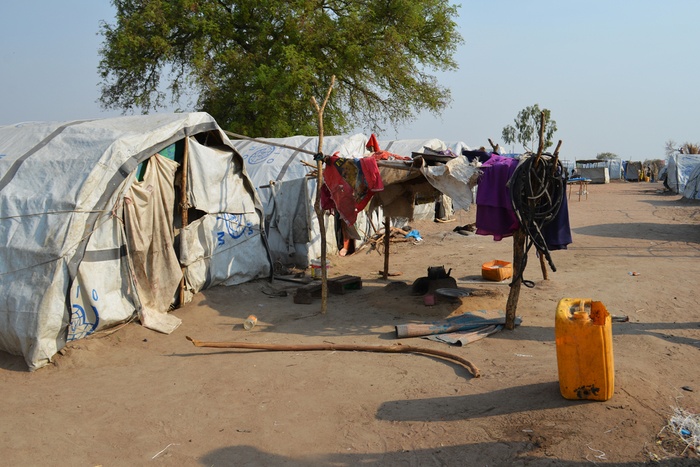In South Sudan, a country with a population of 10.9 million, a staggering 8.9 million people are in need of humanitarian assistance due to conflict, climate shocks, and economic instability.
Three in four families in South Sudan face severe food insecurity. Food insecurity is the highest since the country gained independence in 2011. South Sudan is vastly underdeveloped, lacking basic infrastructure for education, health systems, safe water, functioning markets, or paved roads.
About 80 percent of the population live in rural areas and rely on livestock and subsistence farming to survive. Conflict and climate disasters, including extreme flooding, has destroyed homes and food sources and driven families to flee, often with few resources to survive.
“South Sudan is a country where you see the overlap and compounding impact of conflict, climate crisis, hunger crisis, and disease outbreaks that have been going on for several years,” said Liesbeth Aelbrecht, WHO incident manager for the Horn of Africa. “Three in four South Sudanese need humanitarian assistance [in 2023]; two in three are facing crisis levels of hunger,” she said. “And these numbers are only getting worse.”
The conflict in Sudan has passed the 100-day mark and more than 200,000 people have fled instability to neighbouring South Sudan, creating a growing economic and humanitarian crisis. More than 54,000 people entered the country in July 2023 alone, according to Action Against Hunger, a global nonprofit that is leading humanitarian response efforts in many parts of the country. An estimated 2,100 people are pouring into South Sudan each day, a country where more than half the population is hungry and systems are ill-equipped to handle the influx. While some are Sudanese refugees, approximately 91% of the new arrivals are South Sudanese returnees, making them ineligible for international refugee programs.
“Most people in transit are single mothers with children. When the sun rises, they don’t know how to start their day or how they will meet simple existential needs of food, water, and lodging. We are trying to help, but while people are arriving, funding isn’t.” - Sulaiman Ken Sesay, Action Against Hunger’s Country Director for South Sudan
Providing E2G FOOD bars to the people of South Sudan will offer much-needed relief amid the ongoing humanitarian food crisis. As the country grapples with severe food insecurity, malnutrition, and the devastating impact of conflict and climate disasters, these nutrient-rich bars can help address the immediate needs of the population.
By distributing E2G FOOD bars, our partner aid organizations can provide a convenient and accessible source of nutrition for the most vulnerable, including children, pregnant women, and the elderly. Additionally, the bars' long shelf life and easy-to-distribute packaging make them an ideal solution for reaching remote and conflict-affected areas.
By offering essential nourishment and supporting the health of the South Sudanese people, E2G FOOD bars can play a crucial role in alleviating the hunger crisis and fostering resilience in this struggling nation.
About E2G FOOD bars
Each E2G FOOD (Eat-2-Grow) bar is 120g - more than double the size of a traditional protein bar - and contain 30g of protein, 500 calories and the vitamin and mineral nutritional profile required by the World Food Programme.
Meticulously crafted with a mindful selection of nutrient and flavour-packed ingredients, E2G FOOD bars are designed as humanitarian and disaster food relief for regions, communities and first responders with limited access to nutritious food.
Biodegradable packaging
No cooking or refrigeration required
Internationally certified
Your donation of food will alleviate the suffering of the people, families and communities of South Sudan and provide a sense of hope and empowerment in a time when these are so desperately needed.
Thank you
E2G FOOD: EAT-2-GROW FOOD FZ-LLC is a limited liability company.







